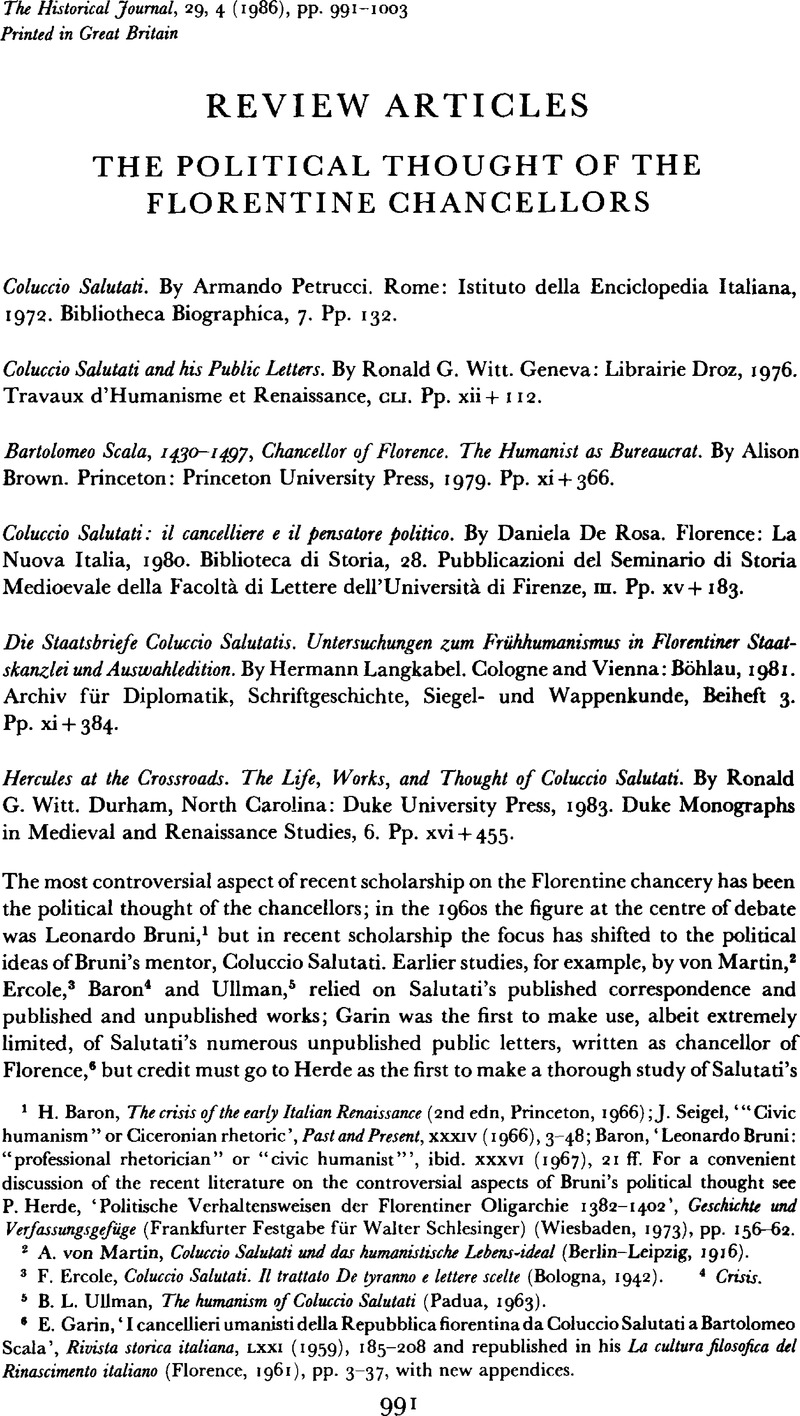Article contents
The Political Thought of the Florentine Chancellors
Published online by Cambridge University Press: 11 February 2009
Abstract

- Type
- Review Articles
- Information
- Copyright
- Copyright © Cambridge University Press 1986
References
1 Baron, H., The crisis of the early Italian Renaissance (2nd edn, Princeton, 1966)Google Scholar; Seigel, J., ‘“Civic humanism” or Ciceronian rhetoric’, Past and Present, XXXIV (1966), 3–48CrossRefGoogle Scholar; Baron, ‘Leonardo Bruni: “professional rhetorician” or “civic humanist”’, ibid. XXXVI (1967), 21 ff. For a convenient discussion of the recent literature on the controversial aspects of Bruni's political thought see Herde, P., ‘Politische Verhaltensweisen der Florentiner Oligarchic 1382–1402’, Geschichte und Verfassungsgefüge (Frankfurter Festgabe für Walter Schlesinger) (Wiesbaden, 1973), pp. 156–62Google Scholar.
2 von Martin, A., Coluccio Salutati und das humanistische Lebens-ideal (Berlin-Leipzig, 1916)Google Scholar.
3 Ercole, F., Coluccio Salutati. Il trattato De tyranno e lettere scelte (Bologna, 1942)Google Scholar.
4 Crisis.
5 Ullman, B. L., The humanism of Coluccio Salutati (Padua, 1963)Google Scholar.
6 Garin, E., ‘I cancellieri umanisti della Repubblica fiorentina da Coluccio Salutati a Bartolomeo Scala’, Rivista storica italiana, LXXI (1959), 185–208Google Scholar and republished in his La cultura filosofica del Rinascimento italiano (Florence, 1961), pp. 3–37Google Scholar, with new appendices.
7 Herde, P., ‘Politik und Rhetorik in Florenz am Vorabend der Renaissance’, Archiv fur Kulturgeschichte, XLVII (1965), 141–220Google Scholar.
8 Rigacci, G., Lini Coluci Pieri Salutati Epistolae ex cods, mss nunc pnmum in lucem editae (2 vols. Florence, 1741–1742)Google Scholar.
9 Herde, , ‘Politik und Rhetorik’, p. 159Google Scholar.
10 Ibid. pp. 174–7, 181, 184–5, 193–203, 206–8.
11 Witt, R., ‘The De tyranno and Coluccio Salutati's view of politics and Roman history’, Nuova rivista storica, LII (1969), 462Google Scholar; see pp. 450 ff.
12 Crisis, pp. 146 ff.
13 Witt, , ‘The De tyranno’, pp. 466 ffGoogle Scholar.
14 See the documents published and discussed by Lindner, T., Geschichle des deutschen Reiches unter König Wenzel, II (Braunschweig, 1880), 504–6Google Scholar.
15 Herde, , ‘Politik und Rhetorik’, pp. 163–4Google Scholar; Bayley, C. C., ‘Petrarch, Charles IV, and the “Renovatio Imperii”’, Speculum, XVII (1942), 323–41CrossRefGoogle Scholar.
16 Witt, , ‘The De tyranno’, pp. 438–9, 450 ff.Google Scholar; Herde, , ‘Politik und Rhetorik’, pp. 163–4, 210–12Google Scholar; Witt, , C.S. and his public letters, pp. 53 ff.Google Scholar; De Rosa, pp. 136 ff.
17 Herde, , ‘Politik und Rhetorik’, p. 159Google Scholar.
18 Marsh, D., The Quattrocento dialogue (Cambridge, Mass. 1980)CrossRefGoogle Scholar.
19 Ed. in Opera omnia (Basel, 1538), pp. 1–31Google Scholar; reprinted in vol. I of R. Fubini's edition of Poggio's Opera omnia (Turin, 1964–9). For recent bibliography see the introduction by Kohl, B. to the English translation in Kohl, B. and Witt, R., The earthly republic (Manchester, 1978), pp. 231 ffGoogle Scholar.
20 See Kristeller, P. O., Renaissance thought, II (New York, 1965), 53 ffGoogle Scholar.
21 The most important recent discussions of this theme in Salutati's thought are by Witt, , Hercules, pp. 198–208, 330–54, 360–1, 425 ff.Google Scholar and Trinkaus, C., In our image and likeness (London, 1970), I, 67–9Google Scholar.
22 De Rosa, p. xii; Emerton, E., Humanism and tyranny (Cambridge, Mass. 1925), pp. 58 ffCrossRefGoogle Scholar.
23 Crisis, esp. pp. 100 ff., 123 ff., 146 ff.
24 Witt, , ‘The De tyranno’, p. 470Google Scholar.
25 Ibid. p. 458.
26 Ibid. p. 434 n. 1; p. 445 n. 45; pp. 464–5 n. III; p. 470 n. 137; p. 472 n. 146.
27 Salutati and his public letters, p. XI. See also Renaissance studies in honor of Hans Baron, ed. Molho, A. and Tedeschi, J. A. (Florence, 1971), p. 175–99Google Scholar.
28 Witt, , ‘The De tyranno’, pp. 443–50Google Scholar.
29 Ibid. pp. 463–70; see esp. n. III, pp. 464–5, for criticism of Baron's views of Salutati and Caesar.
30 Ibid. pp. 463–70.
31 See esp. Crisis, pp. 102, 124, 147, 160.
32 Ed. Garin, E., Prosatori latini del Quattrocento (Milan, 1952), p. 16Google Scholar.
33 In our image, I, 57 ff.
34 ‘The De tyranno’, p. 470.
35 Davis, C., ‘Ptolemy of Lucca and the Roman Republic’, Proceedings of the American Philosophical Society, CXVIII (1974), 30–50Google Scholar.
36 Rubenstein, N., ‘Political theories in the Renaissance’, in Chastel, A. et al. , The Renaissance: essays in interpretation (London, 1982), pp. 153 ffGoogle Scholar.
37 Skinner, Q., The foundations of modern political thought (Cambridge, 1978), I, 41 ff.,53 ffGoogle Scholar.
38 Rubinstein, , ‘Political theories’, pp. 153 ffGoogle Scholar.
39 ‘The De tyranno’, pp. 450–1.
40 N. Rubinstein, ‘Florentine constitutionalism and Medici ascendancy in the fifteenth century’, in Florentine Studies, ed. idem (London, 1968), pp. 442–55.
41 Najemy, J., Corporatism and consensus in Florentine electoral politics, 1280–1400 (Chapel Hill, 1982), pp. 263–99Google Scholar.
42 Ibid. p. 311.
43 Ibid. pp. 308–9.
44 ‘Politische Verhaltensweisen’, pp. 156–249 passim.
45 Brucker, G., The civic world of Renaissance Florence (Princeton, 1977), p. 290Google Scholar; see ibid. pp. 284–94 and his ‘Humanism, politics and the social order in early Renaissance Florence’ in Florence and Venice: comparisons and relations, ed. S. Bertelli et al. (Florence, 1979), I, 3–11.
46 Black, R., Benedetto Accolti and the Florentine Renaissance (Cambridge, 1985), pp. 159–63CrossRefGoogle Scholar.
47 Ibid. p. 163 n. 117.
48 Herde, , ‘Politik und Rhetorik’, pp. 163–4Google Scholar, 210–12; De Rosa, pp. 141 ff.
49 Rubinstein, N., ‘The place of the empire in fifteenth-century Florentine political opinion and diplomacy’, Bulletin of the Institute of Historical Research, XXX (1957), 125–35CrossRefGoogle Scholar.
50 Idem, The government of Florence under the Medici (Oxford, 1966), pp. 128 ff., 218 ff.
51 Black, , Accolti, pp. 138–72Google Scholar.
- 3
- Cited by


